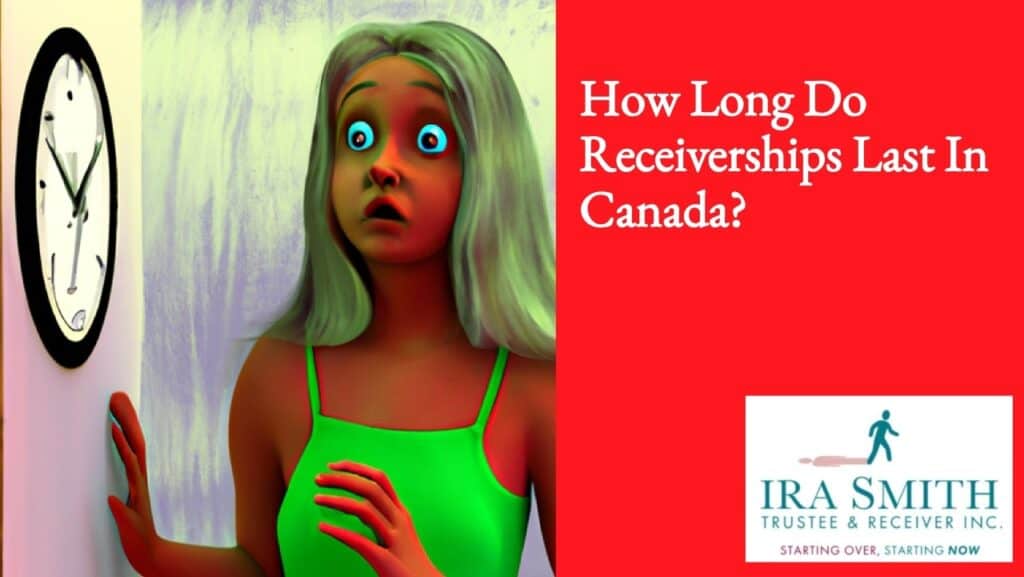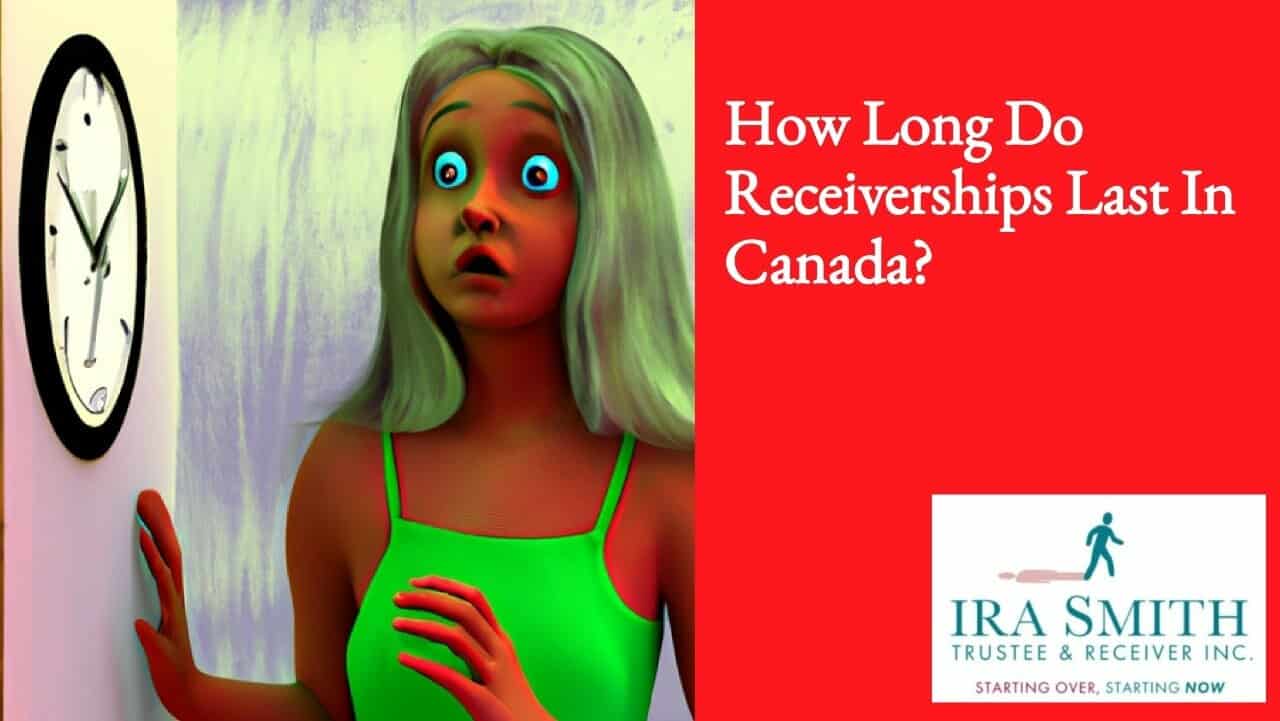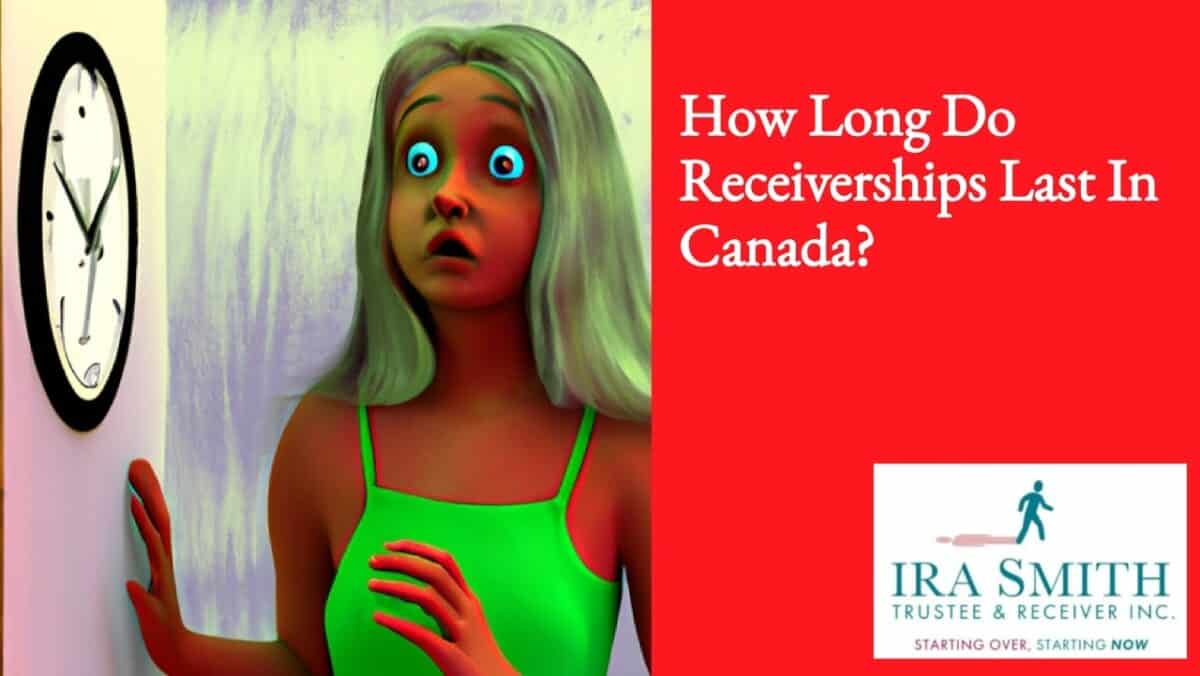How long do receiverships last in Canada? Introduction
In my September 2021 Brandon’s Blog, THE CANADIAN RECEIVERSHIP EASY BEGINNERS GUIDE, I provided an easy-to-understand guide to understand the receivership process. To summarize, I described that in Canada, a receivership is a legal remedy available to secured creditors to recover outstanding amounts under a secured loan if a company defaults on its loan payments. It may also be used in shareholder disputes to complete a project, liquidate assets, or sell a business.
A court may appoint a receiver to take possession of assets, oversee liquidation proceedings, and distribute the proceeds according to the applicable legal priorities as outlined in Canada’s Bankruptcy and Insolvency Act (BIA). Or, a secured creditor may issue a letter of appointment to the same effect.
Through a court-ordered receivership, a neutral third party—known as a receiver—is appointed to take control of assets or business operations in order to preserve value and prevent waste, misappropriation, or financial collapse. This paper examines court-ordered receivership as a strategic, procedural, and equitable remedy under Ontario law.
How long do receiverships last? The answer varies significantly based on each unique situation. In Canada, receiverships typically range from several months to multiple years, with no standard timeline set by law.
A receiver’s appointment concludes when they have successfully sold sufficient assets to repay the secured creditor who initiated the receivership. Once the debt is satisfied through asset liquidation, the receiver files their final report with the court, and the receivership officially terminates.
For Canadian businesses facing financial difficulties, understanding receivership timelines helps in planning and decision-making during these challenging periods.
It is essential to recognize that receivership and bankruptcy are distinct legal proceedings. Bankruptcy is a formal proceeding, regulated by the BIA, to provide debtors with debt relief when they are financially incapable of paying their unsecured creditors. Conversely, a receivership is a process available to secured creditors to recuperate outstanding debt arising from a secured loan or to address shareholder disputes.
The purpose of this Brandon’s Blog is to answer the question I am often asked: “how long do receiverships last in Canada?”.

How long do receiverships last in Canada? Understanding what receivership is
There are two types of receiverships in Canada: court-appointed receiverships and private receiverships. Court-appointed receivers are appointed by a court to oversee the management and disposition of a debtor’s assets. Private receivers are appointed by secured creditors as part of a loan agreement and the security agreement between the debtor company and the creditor.to manage and sell a business debtor’s assets outside of the court system.
The receiver, regardless if it is a court-appointed receiver or privately appointed receiver, takes control of a company’s assets and business operations to repay outstanding debts to creditors. The receiver’s primary duty is to maximize the value of the assets and distribute the proceeds to the creditors according to their priority ranking. The receiver has the power to sell, manage, or liquidate the assets and may also negotiate with creditors to restructure the company’s debt.
Some key players in a receivership process are:
- Borrower: The owner of the property who defaults on their loan obligations or faces financial distress.
- Lender: The secured lender, normally a financial institution, who initiates the receivership action to protect their interest in the property and recover their debt.
- Receiver: The neutral third party who is a licensed insolvency trustee (formerly called bankruptcy trustees) and is appointed either privately or by the court to take charge of the property and manage it toward a sale or resolution.
- Court: The judicial authority that grants or denies the receivership request, sets the terms and conditions for the receiver’s appointment and oversees the receivership process.
- Law firm: The lawyers who are acting for the lender, the borrower and the court-appointed receiver.
The powers and duties of a receiver can vary depending on the nature of the assets or the court order appointing them. Generally, it includes taking control of the assets, managing them in a financially responsible manner, and reporting to the court and parties involved in the dispute.
The duration of receiverships in Canada can vary depending on the specific circumstances of the case, but it typically lasts for a few months to over a year.

How long do receiverships last in Canada?
Several factors will affect the duration of receivership in Canada, including:
- the complexity of the case;
- the number and nature of the assets involved;
- the cooperation of the parties involved; and
- the efficiency of the court system.
Other factors may include the availability of qualified professionals to manage and sell the assets, the level of creditor involvement and negotiation, and the overall economic and market conditions at the time. Ultimately, the length of receivership will depend on the specific circumstances of each case.
Court supervision is the oversight provided by a court in a court-appointed receivership. The purpose of court supervision is to appoint the receiver, to allow for the receiver to obtain the approval of the court to decisions and actions the court-appointed receiver wishes to take, to ensure that the receiver acts in the best interest of all parties involved and follows the court’s orders and to allow a forum for any aggrieved party to bring their dispute to the court for adjudication.
Termination of a receivership occurs when the court is satisfied that the receiver has fulfilled their duties and objectives or when the receiver’s appointment is no longer necessary. The court terminates a receivership by court order after approving the receiver’s final report and accounts.

How long do receiverships last in Canada? Frequently asked questions (FAQs)
Navigating receiverships can be a tricky and complex situation. Asking questions like “how long do receiverships last in Canada?” is essential to any company dealing with financial hardship. Here I will cover some of the common FAQs associated with receiverships in Canada, and provide an in-depth look at the timeline of these proceedings. It is essential to have a thorough comprehension of receiverships to successfully manage this situation.
What are the differences between bankruptcy vs. receivership?
Receivership is a process to secure the rights of secured creditors, allowing for the control and eventual sale of the assets of a distressed company. Bankruptcy, on the other hand, is a legal process which allows a company in financial difficulty to reorganize its affairs or liquidate its assets under the guidance of an insolvency trustee – providing a safety net to unsecured creditors.
What happens during a receivership process in Canada?
As part of the receivership process in Canada, a receiver is appointed to handle a company’s assets and activities, facilitating the sale of these to settle the company’s debt to creditors.
How does a receiver sell a business or assets?
To sell a business or assets, a receiver has many options available. A receiver can:
- advertise the assets for sale by running a tender bid sales process;
- a tender bid sales process could be stand-alone or could be combined with a stalking horse sales process;
- the assets could be liquidated through a public auction using the services of an auctioneer;
- the receiver could hand all the assets over to a liquidator in order to sell the assets in an online auction;
- in certain circumstances, the receiver may wish to hire a professional business broker experienced in that particular industry or assets the receiver took possession of; or
- for retail store assets, the receiver may sell the entire package of assets and will then run a retail sale to the public.
Regardless of the process chosen, the receiver’s aim is to market and sell the assets or business and obtain the best price for the assets or business under the circumstances.
How does a creditor apply for receivership in Canada?
Secured lenders can apply for receivership in Canada by filing an application to the court under a federal or provincial statute or enforcing their security rights by appointing a receiver privately through a security instrument by way of an appointment letter. A receivership is a remedy that allows a secured creditor to take control of and sell the debtor’s property and assets to collect their secured debt through a private or court appointment process.
Can a receivership be stopped or avoided?
Receivership can sometimes be stopped or avoided through negotiation with the secured creditor(s), restructuring or refinancing of debts, or by finding alternative sources of funding. However, whether or not it can be stopped or avoided depends on the specific circumstances of each case. The cessation of receivership will not be easy unless the secured creditor is being paid out.

How does a creditor enforce a secured loan in Canada?
In Canada, a creditor can enforce a secured loan by appointing a receiver under a private contract or through the court process. Upon appointment, the receiver will seize and sell the secured assets or the assets set out in the court order to recover the amount owed.
However, before being able to appoint the Receiver, there have to be one or more events of default as described in the loan agreement. Then, the lender must be reasonable in allowing the company borrower to cure the default. If the company in default does not remedy the default(s) and the lender has lost confidence, the lender can then make a written demand on the company to repay the entire loan, plus interest and costs and also serve the necessary statutory form on the defaulting borrower.
The lender must give the borrower a reasonable period of time to repay the secured lender’s debt. Reasonable time will vary depending on the unique circumstances of the situation. In Canada, the minimum amount of time that has to be given is 10 days, unless the borrower acknowledges in writing that they can never repay the debt and is waiving the notice period.
What are the legal options available to recover outstanding loan payments?
Legal options available to recover outstanding loan payments may include sending demand letters, filing a lawsuit, obtaining a judgment and using collection methods such as wage garnishment or asset seizure.
How long does the bankruptcy process take in Canada?
The timeline of a corporate bankruptcy process depends on the uniqueness and complexity of each individual situation. There is no typical timeline, but, it could be a year or more from the start of the bankruptcy until the licensed insolvency trustee is discharged.
How do I liquidate assets in Canada?
When seeking to divest yourself of some assets you have a plethora of choices – in the case of an asset like real estate, you can list it on the public market. Alternatively, you can try to find the right buyer on your own. Or, if you’d like some professional assistance, enlist the help of a savvy broker or financial adviser.
What are the consequences of not paying off secured loans in Canada?
In Canada, if you don’t pay back a secured loan, the lender may reclaim the collateral you put up, personal property like a car or real property such as a house. Don’t let your possessions be taken away! Be sure to make all loan payments in a timely manner.

How long do receiverships last in Canada? Conclusion
So I hope that you now have a good appreciation for receiverships in Canada including the answer to the question “how long do receiverships last in Canada?”. If your company or business is under financial pressure and your secured creditor is about to demand full repayment of all loans, you need immediate professional advice.
Revenue and cash flow shortages are critical issues facing entrepreneurs and their companies and businesses. Are you now worried about just how you or your business are going to survive? Are you worried about what your fiduciary obligations are and not sure if the decisions you are about to make are the correct ones to avoid personal liability? Those concerns are obviously on your mind. Coming out of the pandemic, we are also now worried about the economic effects of inflation and a potential recession.
The Ira Smith Team understands these concerns. More significantly, we know the requirements of the business owner or the individual that has way too much financial debt. You are trying to manage these difficult financial problems and you are understandably anxious.
It is not your fault you can’t fix this problem on your own. The pandemic has thrown everyone a curveball. We have not been trained to deal with this. You have only been taught the old ways. The old ways do not work anymore. The Ira Smith Team makes use of new contemporary ways to get you out of your debt problems while avoiding bankruptcy. We can get you debt relief now.
We have helped many entrepreneurs and their insolvent companies who thought that consulting with a trustee and receiver meant their company would go bankrupt. On the contrary. We helped turn their companies around through financial restructuring.
We look at your whole circumstance and design a strategy that is as distinct as you are. We take the load off of your shoulders as part of the debt settlement strategy we will draft just for you.
The Ira Smith Trustee & Receiver Inc. team understands that people facing money problems require a lifeline. That is why we can establish a restructuring procedure for you and end the discomfort you feel.
Call us now for a no-cost consultation. We will listen to the unique issues facing you and provide you with practical and actionable ideas you can implement right away to end the pain points in your life, Starting Over, Starting Now.





